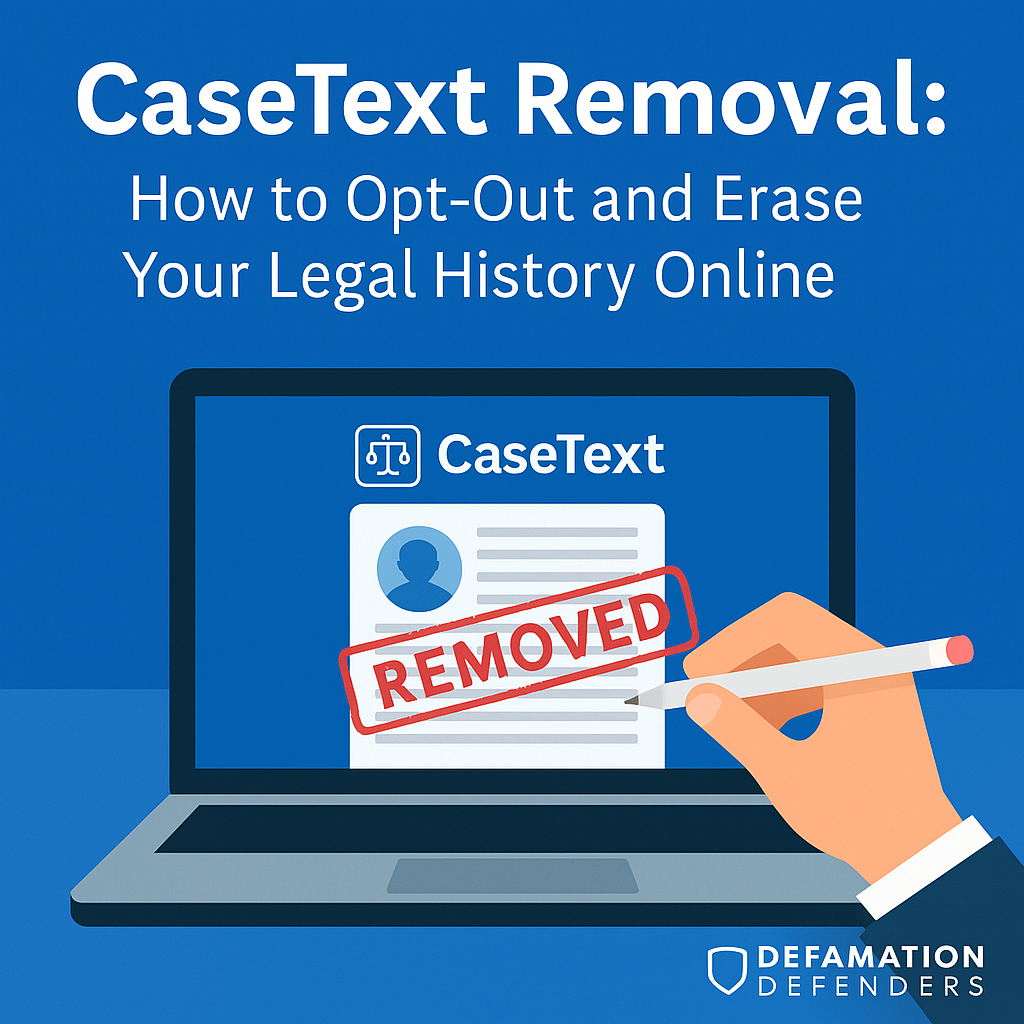Estimated reading time: 4 minutes
Table Of Content
Why CaseText Listings Can Harm Your Reputation
CaseText is a legal research platform used by attorneys, journalists, and the general public to access court filings, rulings, and litigation summaries. While its mission to promote access to legal knowledge is admirable, its unfiltered database can unintentionally expose sensitive personal details, including:
- Your name, address, and associations
- Allegations or accusations (regardless of outcome)
- Business disputes or personal lawsuits
- Federal or state-level case involvement
Such exposure can be damaging even when you’ve been cleared of wrongdoing. This is why CaseText removal is a vital step in any online privacy and reputation management strategy.
What Does CaseText Publish?
Unlike people search sites, CaseText focuses exclusively on legal content. However, the scope and depth of its database can have a far-reaching impact.
CaseText May Display:
- Party names (plaintiffs and defendants)
- Case summaries and procedural history
- Judge and attorney names
- Legal issues and arguments
- References to sealed or sensitive matters if not properly redacted
Since CaseText sources court opinions from PACER and other public databases, once indexed, this information can appear in search engines and on third-party aggregators as well.
How CaseText Content Gets Indexed on Google
Google’s algorithm favors authoritative legal websites. CaseText, backed by legal citations and academic trust, frequently ranks high in search results. This means your name, connected to a case—even one resolved in your favor—can be among the first things people see when they Google you.
Step-by-Step: How to Remove Your Name from CaseText
While CaseText does not have a public-facing opt-out form, you can submit a removal or redaction request by contacting their legal support team.
Step 1: Search CaseText for Your Name
Visit https://casetext.com and search:
textCopyEdit"Your Full Name" + case
"Your Business Name" + court
"State court opinions" + surname
Record the URLs of the relevant cases or legal opinions containing your name.
Step 2: Review for Removable Grounds
Your request is more likely to be successful if:
- The case has been sealed or expunged
- The reference is outdated or inaccurate
- You’re a minor or uninvolved party named erroneously
- The content violates privacy or redaction policies
Step 3: Contact CaseText Support
Email: support@casetext.com
Here’s a professional template:
textCopyEditSubject: Request for Content Removal or Redaction
Dear CaseText Legal Team,
I respectfully request the removal or redaction of personally identifiable information related to the following cases published on your website:
[List URLs or case names]
This request is based on concerns regarding privacy, outdated information, or sealed court documents. I have attached relevant supporting documents (e.g., expungement order, court documents, or ID verification).
Please confirm receipt of this message and the anticipated timeframe for resolution.
Sincerely,
[Full Name]
[Email Address]
Step 4: Attach Supporting Documents
Helpful attachments include:
- Court orders for expungement or sealing
- Case disposition summaries
- Government-issued ID
- Screenshots of the content
Document everything. Maintain a paper trail in case legal intervention becomes necessary.
What If CaseText Doesn’t Respond?
If CaseText declines your request or ignores it:
- Submit a formal complaint to the State Bar Association (if attorneys are involved)
- Request Google de-indexing using their outdated content tool
- Begin search suppression efforts to reduce visibility
- Consult with a defamation or privacy attorney
Legal Grounds for CaseText Removal
Many U.S. states have passed privacy laws that give you more control over your data online.
Applicable Legal Tools:
| Law | Rights Granted |
|---|---|
| CCPA (California) | Right to request data deletion |
| VCDPA (Virginia) | Opt-out from personal data use |
| UCPA (Utah) | Limited rights but allows removal request |
| Expungement Statutes | Court orders can mandate redaction |
| FERPA (if student data) | Privacy for educational records |
👉 View the full comparison of state laws here
Suppressing CaseText from Google
If removal isn’t possible, SEO suppression helps push negative content out of sight. Defamation Defenders offers custom suppression strategies to manage visibility.
Suppression Strategy:
- Publish authoritative content under your name
- Optimize social profiles (LinkedIn, Crunchbase, About.me)
- Leverage PR, blogs, and professional bios
- Acquire backlinks from trusted domains
- Regularly update high-ranking assets
This reduces visibility of unwanted listings while enhancing your professional presence.
How Defamation Defenders Can Help
Defamation Defenders specializes in removing legal records from search engines and suppressing harmful content across major platforms.
Our Services Include:
- Court record opt-out and removal management
- CaseText and aggregator monitoring
- SEO suppression of legal opinions
- Legal coordination for sealed or expunged records
- Real-time updates and monthly audits
📞 Request a confidential case review today to see if your CaseText removal qualifies for expedited handling.
Frequently Asked Questions (FAQ)
Not unless your record is sealed or a legal basis is presented. However, they may agree to redact voluntarily.
Only if the underlying content is removed or violates its policies. Suppression is typically a more effective option.
Only sealed records and de-indexed pages offer long-term protection. Continuous monitoring is recommended.
CaseText is just one of many. We recommend a full reputation audit to assess additional exposure.
Yes, our team works across all major legal data aggregators and people search sites.
Related Content You Might Like:
More Legal Data Aggregate Opt-Out Guides



